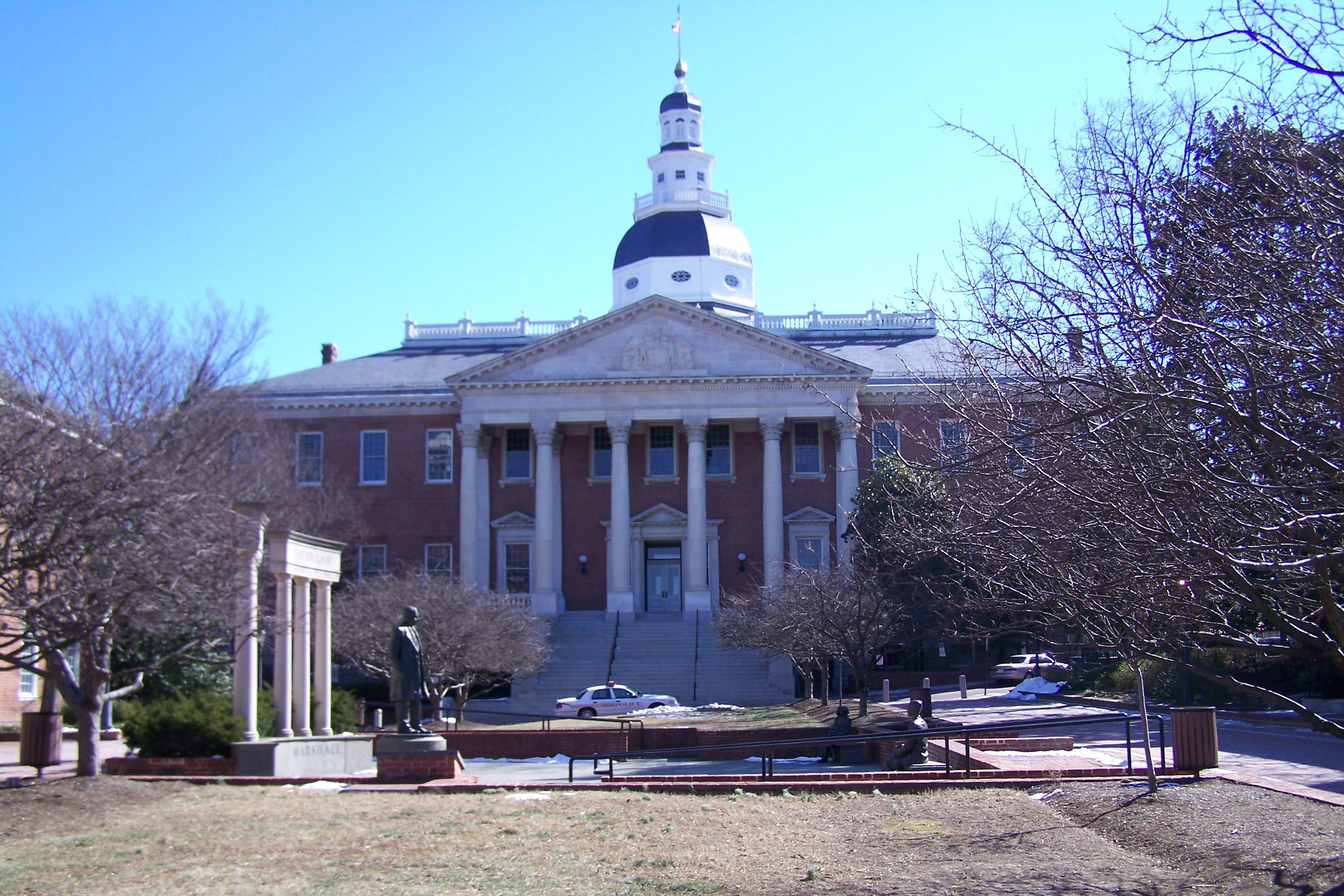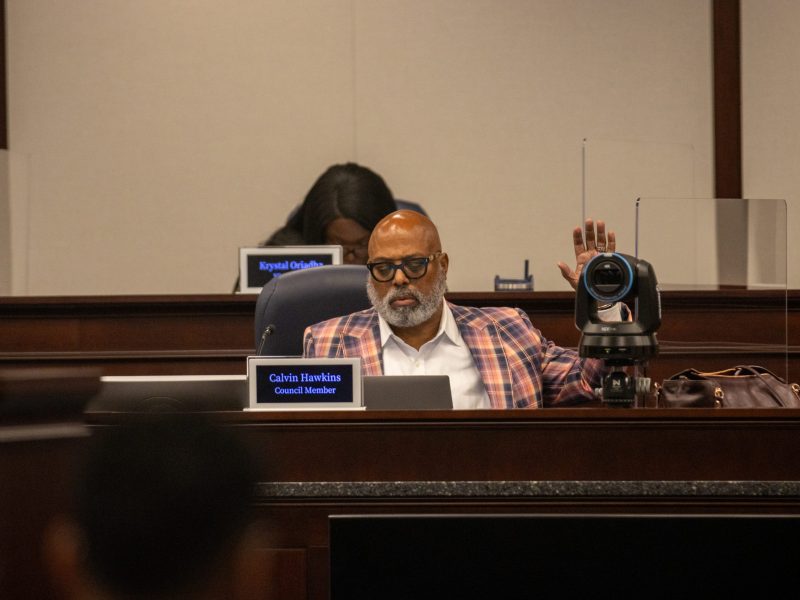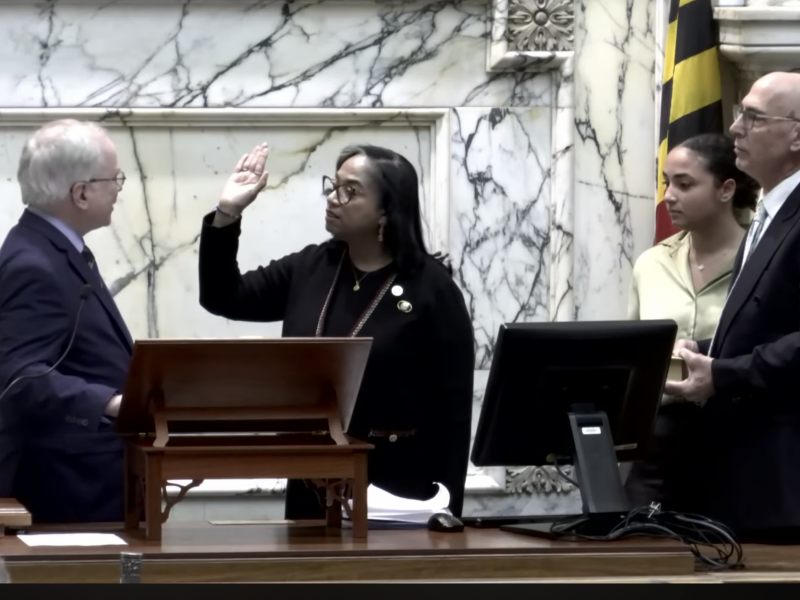The hectic final day of the Maryland state legislative session Monday night was one tinged with grief as lawmakers mourned the death of House Speaker Michael Busch (D-Anne Arundel) while racing to pass hundreds of bills before the midnight deadline.
Busch, the longest-serving House Speaker in state history, died Sunday after a battle with pneumonia. His death left a palpable gloom over sine die, the final day of the 90-day legislative period.
Gov. Larry Hogan closed the marathon session with some remarks about Busch as members of both chambers crowded into the House chamber just before midnight.
“Together we mourn the tragic loss of a great man, an outstanding Marylander and a dedicated public servant,” Hogan said. “A significant chapter in our state’s history sadly comes to an end. Throughout his entire distinguished career, for 32 legislative sessions, Mike Busch was a leader in Annapolis, a pillar of state government and a larger-than-life figure of this House chamber.”
The tribute capped a legislative session that saw several key pieces of legislation pass, including bills gradually increasing the minimum wage to $15 per hour, raising the legal smoking age from 18 to 21, reshaping the University System of Maryland Board of Regents and banning styrofoam statewide.
State minimum wage increase
Maryland lawmakers overrode Hogan’s veto to approve a bill that would gradually increase the state’s minimum wage from the current rate of $10.10 to $15 per hour by 2026. A day prior, Hogan vetoed the bill, saying it would “cost us jobs, negatively impact our economic competitiveness and devastate our state’s economy.”
The veto-proof majorities in the Democrat-led General Assembly ensured that the minimum wage will increase to $15 an hour by 2025 for businesses with 15 or more employees and by 2026 for smaller businesses.
The bill’s sponsor, Sen. Cory McCray (D-Baltimore City), said its passing was a victory for Maryland, and particularly for “those areas of concentrated poverty” in the state’s largest city.
He said he was pleased with the bill despite some critics arguing that the increase is too gradual and may not keep up with inflation.
“We’re very happy where we’re at,” he said. “We’ll see when we get there.”
[Read more: UMD grad students surprised by sudden failure of collective bargaining bill]
The first increase to $11 will occur on Jan. 1, 2020, and subsequent 75 cent increases will occur every January for the next four years. A final $1 increase will bring the minimum wage to $15 in 2025.
Hogan had proposed a more moderate increase to $12.10 per hour by 2022 in order to wait for surrounding states including Virginia, Pennsylvania, West Virginia and Delaware to increase their minimum wages.
“In the spirit of compromise, I provided the General Assembly with several reasonable options that would have provided for an increase in the minimum wage but not negatively impact jobs and businesses in Maryland,” Hogan’s letter said. “Unfortunately, those efforts were completely ignored.”
Tobacco age increase
In response to increased use of vapes and e-cigarettes among teenagers, the General Assembly moved Wednesday to raise the state’s smoking age from 18 to 21. Hogan has not indicated whether he will sign it into law, but it passed with veto-proof majorities in both chambers.
The bill’s sponsor, Del. Dereck Davis (D-Prince George’s), said raising the age will ideally prevent teens from eventually switching to cigarettes.
“After years of decline, the trend is going the other way and vaping is all the rage,” Davis said. “There’s this sentiment that somehow it’s safer than cigarette smoking. It has all the dangers that we’re trying to keep our kids away from.”
Several other states, as well as Washington, D.C., have made similar changes in recent years to combat the rising popularity of e-cigarettes among teens.
[Read more: A Maryland law is set to add a non-binary gender option to driver’s licenses]
The bill, which would take effect Oct. 1, exempts those who show military identification, a change Davis said was a compromise with the Senate to get the legislation passed.
“I don’t see it as some sort of benefit,” Davis said of the exemption. “Our military folk, they work hard, they serve us. … They already take inherent dangers with what they do, and putting [e-cigarettes] out there is one more danger.”
“The Senate wanted it, so we acquiesced,” he added.
JUUL, one of the largest makers of e-cigarettes, has offered its support for the age increasing. On JUUL’s website, customers under 21 can’t purchase the company’s products, because it says they’re “designed for adult smokers.”
Some critics in Annapolis have called the bill a “nanny state” reform or said it unnecessarily interferes with residents’ freedom of choice.
“I have conflicting feelings about it,” said Del. Nic Kipke (R-Anne Arundel). “I talked to a lot of people in my district about it, and they very much opposed the legislation. … So I’m standing by my voters on this one.”
Board of Regents reform
After the the University System of Maryland Board of Regents faced criticism for its handling of the Maryland football scandal, Del. Ben Barnes (D-Prince George’s County) sought to remake the board to increase accountability and transparency for the body that oversees the state’s higher education system.
Barnes and Sen. Sarah Elfreth (D-Anne Arundel County) sponsored legislation that would add four new members to the 17-member board, require open meetings to be live-streamed and make vote tallies for all sessions publicly available, among other reforms.
“It provides considerable oversight and reforms both to the openness of the process and to the structure for the board itself,” Barnes said of the bill. “We are going to see a much more open, cohesive board.”
The bill passed unanimously through both chambers of the General Assembly and will now head to Hogan’s desk to be signed.
The governor was one of countless prominent political figures who criticized the board last fall for its handling of investigations into offensive lineman Jordan McNair’s death, saying he was “deeply troubled by the lack of transparency” and that “more must be done to restore the public trust.”
The board came under fire when it recommended university President Wallace Loh retain football coach DJ Durkin, despite two investigations — one into the circumstances of McNair’s death and another on the wider culture of the football team — that found significant problems with the program and Durkin’s leadership.
Much of the board’s deliberations were held behind closed doors with little to no information regarding the investigations released to the public. The legislation passed by the General Assembly would require open meetings to be streamed online and allow a period of public comment.
One day after the board announced its support for Durkin, and following a deluge of public criticism, Loh reversed course and fired the embattled coach.
Sen. Jim Rosapepe (D-Prince George’s) called the board reforms “good steps in the right direction.”
“The regents have to embrace the spirit of the bill and act in a more transparent way and act in a more inclusive way,” said Rosapepe, who represents the University of Maryland’s district. “I think they understand they made a big, big mistake.”
The board declined to make public the vote total on retaining Durkin. At a House committee hearing in November, newly appointed board Chair Linda Gooden was grilled by committee members about it, but would only say it was “not unanimous.”
If signed into law, the board would be required to include “all motions and vote tallies form open and closed sessions in publicly available board meeting minutes.”
Styrofoam ban
In an effort to eliminate single-use plastics, the legislature moved to make Maryland the first state in the country to ban styrofoam.
The legislation passed the House of Delegates by a vote of 100-37 and the Senate by a vote of 31-13, both veto-proof. Hogan has not stated his position on the bill.
Del. Brooke Lierman (D-Baltimore), the sponsor of the bill in the House of Delegates, has tried to pass this legislation since 2017. She credited the bill’s passage to the public’s recognizing polystyrene foam as “the worst of the worst” of single-use plastics.
“Perseverance pays off,” Lierman said. “The public in general has started recognizing the ubiquity of single use plastics and understanding more how damaging they really are to our environment.”
The legislation would ban the usage of styrofoam in food service businesses and schools. However, it would not cover styrofoam products packaged outside of Maryland, foam products used to hold raw meats or any foam products not being used to package food.
Similar bills have been passed in recent years in Prince George’s and Montgomery counties.
Democratic lawmakers made it a priority to pass environmentally focused legislation this session.
“If the mantra is ‘reduce, reuse, recycle,’ we have to be very serious about the reduce part of the equation,” Lierman said. “That means eliminating the worst of the worst, in terms of single-use plastics that are not recycling, that are never going anywhere except our oceans and our rivers and landfills.”
County officials could issue fines of $250 to residents or businesses that violate the rules set by the legislation, which would go into effect on July 1, 2020.
“I’m proud that Maryland can say to the rest of the country and the world, ‘We can do it here, and you can do it, too,’” Lierman said.
Increased penalties for bicycle-involved accidents
The Senate version of a bill that would have raised the maximum penalty for a driver hitting a bike passed the Senate on sine die, but did not receive a vote in the House.
Under the version that passed the Senate, anyone found guilty of reckless driving would face a maximum fine of $1,000 and a mandatory court appearance. It made no specific mention of hitting bicyclists, motorcyclists or pedestrians.
There were nine reported incidents of cars hitting bicycles on this university’s campus between 2017 and 2018, according to University Police.
Legal representation funding for Title IX fees
A year after the General Assembly passed a bill that required the state to pay attorney fees and other costs for students involved in Title IX investigations, but didn’t specify where the money would come from, a second bill passed this session to establish the Legal Representation Fund for Title IX Proceedings.
The bill would require that the Maryland Higher Education Commission dole out those funds to cover “reasonable costs and attorneys fees” for current and former students. The legislation would also mandate the governor include at least $250,000 for the fund in the state’s annual budget by the 2021 fiscal year.
If signed by Hogan, the bill will take effect on July 1.
Mandated organ donor education in public schools
For the second straight year, Shani Kamberi, a junior chemistry major at this university, introduced a bill that would mandate organ donation education in Maryland public schools. The bill, which would have required county boards of education to provide specific curricula to students about organ donation and registration, did not make it out of committee.
University System of Maryland collective bargaining
A bill that would have brought collective bargaining practices for University System of Maryland workers in line with other state workers was given an unfavorable report by the House Appropriations Committee and withdrawn.
The bill, introduced by Del. Ben Barnes (D-Prince George’s), would have allowed the American Federation of State, County and Municipal Employees to negotiate directly with System Chancellor Robert Caret while streamlining how contracts are negotiated and giving more bargaining powers to university workers. Representatives for AFSCME have described the current collective bargaining system as “archaic and broken.”
Collective bargaining for college athletes
In an attempt to give college athletes collective bargaining rights like state employees, a bill introduced by Del. Brooke Lierman (D-Baltimore City) would have required the State Higher Education Labor Relations Board, the independent agency that enforces those laws, to establish a similar process for any student-athlete in the University System of Maryland.
A hearing for the bill was canceled three times before it finally received an unfavorable report from the House Appropriations Committee and was withdrawn without a vote on March 15.
Criminalizing drawing a swastika or hanging a noose
Del. Mark Chang (D-Anne Arundel) introduced a bill that would have made acts intended to “threaten or intimidate any person or group of persons,” such as drawing a swastika or hanging a noose, a misdemeanor offense with a maximum penalty of three years in prison and a $5,000 fine.
The House approved the bill by a vote of 136-2, but it didn’t come to a vote in the Senate.
Initially, the legislation applied only to nooses and swastikas, but the version of the bill that passed out of the House prohibited “placing or inscribing a certain item or symbol on certain property, without the express permission of the owner of the building or property, the owner’s agent, or a lawful occupant.”
There have been 22 hate bias incidents reported at this university during the 2018-19 academic year, according to the Office of Diversity and Inclusion’s log. Five of them have included a swastika in some form.
A previous version of the bill was introduced last session, and similar versions have been introduced over the last decade.
Staff writer Jacob Richman contributed to this report.
This article has been updated.



